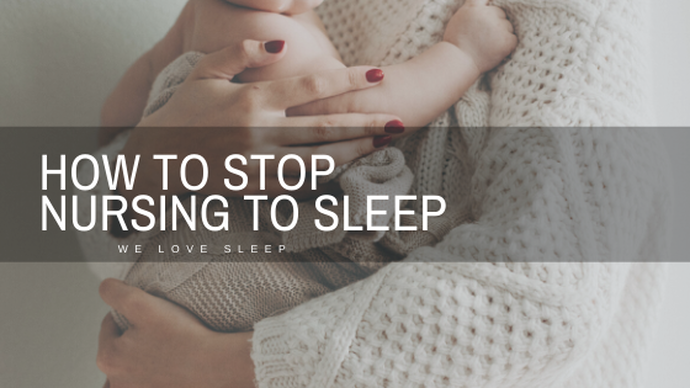|
The first thing I want to say is this: if you enjoy nursing your baby to sleep, and are fine with doing it for bedtime and all wake-ups in the night and naps, and it's working for you - that is fine! There's no need to change anything.
I breastfed both of my babies for over a year, and both of my babies were sleeping completely through the night (11-12 hours straight) without night feedings before 12 weeks old. They did this all on their own- no crying or forced night weaning. This post is not about night weaning or completely weaning from breastfeeding. It's not about your decision to breastfeed, exclusively pump, formula feed, or a mixture or combo of any of those. Those are personal decisions, and the right choice for you is the one that works for you! I'm not advocating breastfeeding over any other type of feeding. I'm a fan of feeding babies, however you want to feed them. This post is for those mamas who enjoy feeding their baby, but want to help their babies learn independent sleep skills. Breastfeeding or bottle feeding babies to sleep is common, and it is also natural. Breastfeeding (especially at night) releases sleepy hormones to moms and babies, and it's a natural way to cuddle and comfort your baby. I've done it with my own babies! And I've used it as a "secret weapon" to get them back to sleep when nothing else worked or when my son had ear infections as an infant and couldn't be calmed any other way. I enjoyed the sleepy milk comas and cuddles with my babies as they nursed to sleep cuddled in my arms. It's sweet, I get it. But I also knew that for me, it was important for others (daycare workers, husband, babysitters) to be able to put my babies to sleep, and I didn't want nursing to sleep to be the only way they could get to sleep. If you're ok with nursing to sleep and it's working for you - YOU GO! That's awesome. If it's NOT working for you, here are some tips to help:
Feeding to sleep can cause babies to not get full feedings, and wake up sooner because they're hungry. When they get full feedings, they're likely to sleep better and longer because they're full. It can cause them to wake up more in the night because when they transition from one sleep cycle to another, feeding to sleep is the only way they know how to get back to sleep, so instead of putting themselves back to sleep and connecting sleep cycles, they are crying until they get fed to sleep again. I've worked with moms who nursed or bottle fed to sleep and thought their babies would grow out of it, and still at age 2-3 years old, the child needed the mom to nurse them to sleep for every nap and bedtime, and all throughout the night. Once a baby has developed a feed-to-sleep association, it's not likely the baby will give it up and learn independent sleep all on their own without being taught, which is what sleep training does. To break your child's feed-to-sleep association, be intentional and consistent with sleep training, and your child can learn to go to sleep completely on their own. If you want to continue to breastfeed during the day (or even keep night feedings if your baby needs them), you can do that as long as you want to! I've helped many moms who had been feeding their babies to sleep, and during our time together, we were able to teach their babies to go to sleep on their own. Imagine being able to cuddle your baby and then lay them down in their crib wide awake, walk out of the room, and watch on the monitor as your baby smiles and coos and falls asleep all on their own within a few minutes. The easiest way to not nurse to sleep is to not ever start that habit - to start from day one allowing your newborn to fall asleep without feeding (which is what I did). But if you missed that window and it's already become a habit, there's never a time when it's TOO LATE to break that habit. You can start today. As long as you have a plan and stay consistent, your child can learn independent sleep! And if you want help, I would love to help you with this! Click HERE to read about my sleep training packages.
0 Comments
Leave a Reply. |
Lynne HowardPediatric Sleep Consultant Archives
June 2023
Categories |


 RSS Feed
RSS Feed
